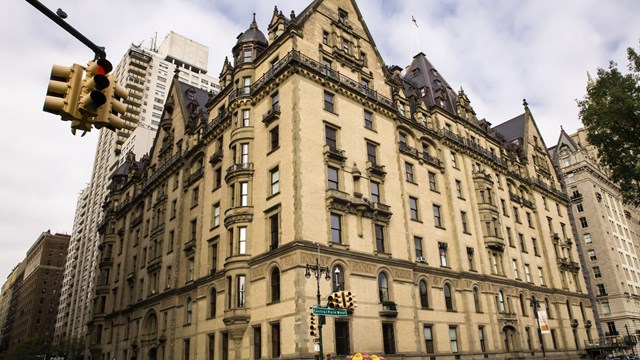Located on the luxurious Upper West Side along breathtaking Central Park West, the San Remo is one of the premier luxury apartment buildings in New York City. The first to incorporate the twin tower concept, this building’s addition to New York’s skyline added grace, beauty, and some interesting architecture along the west side of New York’s largest and most famous park.
Known as a building that has been (and still is) home to many artists and movie stars, the San Remo itself is something of a star, having appeared in several movies. Among those were Neil Simon’s The Odd Couple, and actually, Tony Randall, one of the stars, actually lived here for a time.
The legendary Emery Roth, of Emery Roth and Sons, was the architect behind the design of more than 80 buildings in New York City, including the San Remo, according to Carter B. Horsley in The Upper West Side Book; The San Remo.
Its architecture is, in fact, the San Remo’s most noted feature. As construction began on the building in 1929—just weeks before the market crash that signaled the beginning of the Great Depression—the city enacted its Multiple Dwelling Act, which modified existing zoning laws to allow residential buildings to be built to greater heights, provided they included larger courts and yards.
Although the San Remo occupies the entire block of Central Park West between 74th and 75th Streets, it is actually a large U-shape, with its courtyard facing west, away from the park. According to Horsley, the building was set back from the street 70 feet on all sides, and the towers did not exceed 20 percent of the site, in accordance with the new zoning regulations. The main benefit of the twin-towered building format was the creation of more apartments with more access to light and air.
The spectacular view of the San Remo from Central Park first reveals the twin towers, each 10 stories tall, emerging from the lower 17 floors of apartments. A closer look reveals that the rectangular towers are not exactly symmetrical, but bulge a bit on their western face. The rectangular towers also ascend to two circular “temples” at each top. Even before Ghostbusters immortalized them on film, the Greek design of these temples added a somewhat mysterious, glowering air to the building, and can be traced to Roth’s studies of Greek architecture at the Chicago World’s Fair.
The Greek-inspired towers on the San Remo were no happy architectural accident. Pre-Depression-era developers such as the Bing Brothers and Harris H. Uris retained Roth to design medium-height structures that the architect dubbed “skyscratchers,” according to Barbaralee Diamonstein-Spielvogel, in her book The Landmarks of New York (The Monacelli Press, 2005). Originally designed to conceal water tanks, Roth’s towers eventually evolved into a major element of his designs. The San Remo was designated as a landmark on March 31, 1987. Roth also designed The Beresford, just two blocks south of the San Remo, and many other landmarked buildings.
According to Diamonstein-Spielvogel, “The building is executed in light brick over a three-story base of rusticated limestone. The architectural detailing in stone, terracotta, and metal is late Italian-Renaissance in character. Balustrades, pilasters, engaged columns, broken pediments, garlands, urns, cartouches, scrolls, consoles, and rondoles are all employed to highlight entrance and window configurations.”
The overall design of the San Remo speaks of classical themes, and none of the individual features detract from the composition of the building as a whole. The towers are set back nicely from the base of the building, including terraces that add value to the apartments and the building as a whole, but do not create visual interest of their own. The towers have no corner widows, which gives the building a sense of stoic permanence and majesty. The building seems to be speaking to that segment of the population who are looking for a residence that implies a strong sense of luxury living with an old-world glamour.
“Many of the apartments have had very few owners,” say Jeff Dyksterhouse and Fay Robin, brokers at Prudential Douglas Elliman’s Westside office, “and so they’ve retained a lot of the beautiful original details—such as Art Deco bathroom tiles in lovely colors, shower fixtures, and kitchen cabinets, countertops and sinks.”
Notable Residents
Many famous people have called the San Remo home. In 1982, Steve Jobs, the Apple computer co-founder and CEO bought an apartment occupying the top two floors of the north tower. Jobs spent years renovating the apartment, and after never actually moving in, sold the space to Bono, lead singer for the legendary rock band U2. Rita Hayworth also lived in the building before her death from Alzheimer’s disease, which she left to her daughter, Princess Yasmin Aga Khan.
Many other influential people have taken up residence in the San Remo. The list includes: Steve Spielberg, Donna Karan, Demi Moore, Dustin Hoffman, Steve Martin (who joined two separate apartments when he married actress Victoria Tennant, then separated them again with a soundproof wall after a bitter divorce). Bruce Willis, Eddie Cantor, Robert Stigwood, Zero Mostel, Barry Manilow (who subletted to Raquel Welch), Jack Dempsey, Mary Tyler Moore, Peter Allen, and others have all lived there as well. The San Remo has a long reputation for housing the politically progressive—indeed, it’s reputed to have been the one building whose residents donated the most money to the 2004 John Kerry presidential campaign, according to Glen Justice in a June 23, 2004 New York Times article.
It hasn’t always been about glamour and prestige for the San Remo, however. Shortly after its completion, the building fell victim to the economy of the time. The Great Depression left more than a quarter of the units unoccupied, sending the building into bankruptcy and the bank that held its mortgage out of business in one fell swoop. In 1940, both the San Remo and the Beresford were sold for $25,000—total—over their existing mortgages. Such moves were common in the wake of the Depression, but for two architecturally significant icons such as these, it was a bitter blow.
Location, Location, Location …
Those days, however, are long past. Today, apartment units in the San Remo are in great demand, for a host of reasons. One of the main benefits of a residence in the San Remo apartments—in addition to the obvious proximity to Central Park—is its neighborhood, the Upper West Side. One block away, on Columbus Avenue, residents can find a vast array of shopping and restaurants to choose from. Everything from designer jeans to high-end chocolate can be found along the busy shopping strip, along with Southeast Asian fusion cuisine, Greek food, and a dizzying array of other options.
A walker’s delight, strolling in any direction from the San Remo will lead through the carefully planned and artistic beauty of Central Park, or through a cityscape of shopping, restaurants, and residential homes. Leafy streets lined with brownstones surround the building and comprise the majority of the neighborhood, and the sidewalks are usually filled with families walking their dogs or urban professionals out for a run.
The Museum of Natural History is a short walk north of the San Remo, as is the New York Historical Society. The Rose Space Center, a recent addition to the museum boasts a NASA-quality computer system that powers the state-of-the-art Hayden planetarium. Walking south will shortly lead to Columbus Circle and the shops at Time Warner Center, another prime draw to the area.
Inside the San Remo
The building has been a privately owned co-op since 1972, and its board has a reputation for leniency—at least in comparison to its more conservative, Old Money counterparts across the park. That said, the board did turn down an application from Madonna in 1985—presumably because of her paparazzi following…though their decision also coincided with her “pictorial review” in two popular gentlemen’s magazines, according to Steven Gaines in his book, The Sky’s the Limit (Back Bay Books, 2005).
Gaines goes on to report that renovations have caused a bit of a stir at the San Remo. In addition to the Steve Jobs extravaganza, Donna Karan apparently employed a TV production designer, a lighting designer, and a group from her fashion studio, who completely redesigned the space—all for a two-year sublet.
The renovation obsession includes Bruce Willis and Demi Moore, who went through two years and three different contractors before they finished their revision of Eddie Cantor’s old apartment. Steven Spielberg took three years—two of which included jack-hammering to remove a marble floor. According to Gaines, to soothe relations with downstairs neighbors Marshall Brickman and Jackie Leo, Spielberg rented office space for them elsewhere in the building so they could work in peace. When the work was finally completed, Spielberg then offered to pay for more attractive housing for the rooftop water tank of a neighboring building, the Kenilworth, in order to renovate his view as well.
There are 138 apartments in the San Remo, although the number fluctuates as apartments are combined or split, a la Steve Martin. Units are in very high demand and generally cost no less than $2.5 million dollars. In August of 2005, the late Broadway lyricist Fred Ebb’s 14th floor apartment sold for $10.8 million, according to Dyksterhouse and Robin.
“As a landmark building, the San Remo has had no changes to its façade, but there is constant maintenance and upkeep,” says Dyksterhouse. “The lobbies, elevators, and other public areas underwent a major renovation/restoration in the mid-90’s. They are all imported Italian marble and are absolutely stunning.”
Elements such as those Dyksterhouse mentions, as well as the rich history, commanding views of Central Park, and surrounding Upper West Side atmosphere has made the San Remo a New York signature, and one of the most enviable residences in the city.
Denton Tarver is a freelance writer living in New York City.






6 Comments
Leave a Comment